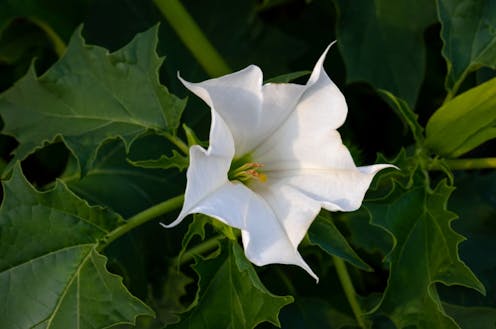The peculiar history of thornapple, the hallucinogenic weed that ended up in supermarket spinach
- Written by David Caldicott, Senior lecturer, Australian National University

The agent that contaminated baby spinach, prompting the recent national recall[1], has been revealed[2]. It’s a weed, not deliberate misadventure or a chemical contaminant.
The culprit is thornapple[3], otherwise known as jimsonweed or, to give it its scientific name, Datura stramonium.
Multiple cases of poisoning, now extending into their hundreds[4], have been reported across numerous Australian jurisdictions in the past couple of weeks, following the consumption of baby spinach.
From blurred vision to hallucinations
Symptoms included[5] blurred vision, dry mouth, abdominal cramps – and quite significant hallucinations. These are all classic symptoms of “anticholinergic poisoning[6]”.
“Toxidromes” are patterns of symptoms that give medical responders clues to what agent might be responsible for a poisoning. Not all types of poisoning come with their own toxidrome, but of those that do, anticholinergic poisoning is one of the most colourful and well-characterised.
There would be very few medical students who would not be familiar with some version of the mnemonic[7]
red as a beet, dry as a bone, blind as a bat, mad as a hatter, hot as a hare, full as a flask.
This reflects the characteristic flushing, drying up of sweating and saliva, dilation of pupils, “altered mental state”, fever and, in some occasions, urinary retention. Additional features can include stomach cramps. An “altered mental state” can manifest as delirium, hallucinations, agitation, restlessness or confusion, together with possible changes in speech and gait, among other effects.
All of these affects are due to toxins that block the action of an essential neurotransmitter (chemical messenger in the nervous system), acetylcholine[8] and its receptor.
These are vital cogs in the autonomic nervous system, the maintenance janitor of our nervous system. Fundamental as it is to our survival, it is hardly a surprise that any disturbance of its function results in fairly dramatic effects.
It is also similarly not that surprising that humans have known about plant materials that exert these effects for as long as humans have been interested in using plants for either therapeutic or nefarious purposes.
Read more: I have always wondered: why are some fruits poisonous?[9]
A rich history of using these plants
Tropane alkaloids[12] are both valuable, and potentially dangerous, compounds with a rich history.
Ancient Egyptians reportedly burned henbane[13] and inhaled its smoke as one of the earliest treatments for asthma.
Deadly nightshade[14] was used in Renaissance Italy as both a poison and as a cosmetic agent, with drops of extract used to dilate the pupils of wealthy ladies. Titian’s Woman with a Mirror[15] is thought to depict this.
Then there were the naked soldiers
Thornapple has its own peculiar story, which is impossible to confirm but may give us clues to the origin of its other name, jimsonweed.
There is a widely reported story[16] from colonial times in Jamestown, Virginia, where British soldiers were sent to quell an uprising in Bacon in the 1600s.
The soldiers prepared a meal from the plant and shortly afterwards, were entirely incapacitated. They were, apparently[17] “stark naked … sitting up in a corner, like a monkey, grinning and making mows at them”. Another of the affected soldiers would “fondly kiss, and paw his companions”.
This was regarded as a something of a worry in an armed expeditionary force. So the plant earned the additional names “devil’s snare” or “devil’s trumpet”.
Read more: Little shop of horrors: the Australian plants that can kill you[18]
Back in Australia
Plants from the Datura genus and the closely related, woody cousin, angel’s trumpet, are widely grown for their decorative flowers around Australia. Occasionally some people deliberately consume them for their hallucinogenic effects, with misadventure requiring medical intervention not uncommon.
Every year, poisons centres and emergency departments around the country are involved in managing these recreational overdoses.
Accidental overdoses, such as the one affecting the baby spinach crop, are less common but not unheard of. One such outbreak was reported in Italy[19] earlier this year.
Unfortunately, thornapple is a hardy plant, with seeds that can reputedly last several decades. Without constant agricultural vigilance, contamination of plants meant for human consumption remains a possibility.
For those not anticipating the effects, poisoning can be quite disturbing, not just from the obvious physical effects, but from the disconcerting hallucinations. Fortunately, the treatment of such exposures, once identified, is usually relatively straightforward.
Given the characteristic toxidrome, and the efficiency of modern poisons information centres, outbreaks and sources can be identified very rapidly, and the public protected from further exposure, as has been the case here.
References
- ^ national recall (www.foodstandards.gov.au)
- ^ revealed (www.theguardian.com)
- ^ thornapple (weeds.dpi.nsw.gov.au)
- ^ into their hundreds (www.foodstandards.gov.au)
- ^ Symptoms included (www.foodstandards.gov.au)
- ^ anticholinergic poisoning (www.ncbi.nlm.nih.gov)
- ^ mnemonic (www.rch.org.au)
- ^ acetylcholine (www.ncbi.nlm.nih.gov)
- ^ I have always wondered: why are some fruits poisonous? (theconversation.com)
- ^ Sailko/Wikimedia (commons.wikimedia.org)
- ^ CC BY (creativecommons.org)
- ^ Tropane alkaloids (www.ncbi.nlm.nih.gov)
- ^ henbane (www.ncbi.nlm.nih.gov)
- ^ Deadly nightshade (www.rcpe.ac.uk)
- ^ Woman with a Mirror (www.fs.usda.gov)
- ^ widely reported story (wydaily.com)
- ^ apparently (docsouth.unc.edu)
- ^ Little shop of horrors: the Australian plants that can kill you (theconversation.com)
- ^ in Italy (www.napolike.com)

















